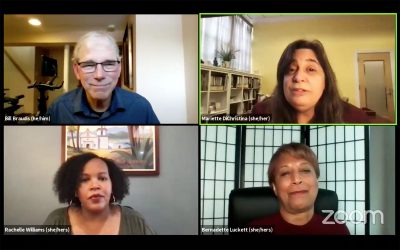“Making it” in Hollywood is an intimidating feat for aspiring film and TV professionals, but, as Boston University panelists show us, not an impossible one.

The College of Communication hosted a panel called “Black, Female and Funny: Two women discuss writing comedy for TV” Wednesday, featuring Black female comedy TV writers thriving in their fields after overcoming barriers in the industry.
Event moderator Bill Braudis, assistant professor of film and television at BU, said in an interview he began working to create the panel this summer as a member of the COM Diversity, Equity and Inclusion Committee. He said this event was created as part of the Committee’s effort to address diversity in each department in the college.
Braudis said he hopes students who attended Wednesday’s panel feel more optimistic about breaking into the intimidating Hollywood industry and learned some helpful tips to do so.
“I want students to feel like they have something, some tools, to deal with stuff if they are a person of color or a female,” he said. “But also, I want them to be encouraged that you can get jobs, this can happen, because I think people get very discouraged.”
Rachelle Williams, a 2007 COM alumna, is now a co-executive producer at HBO Max and was a panelist at the event.
Reflecting on her journey in film and TV, Williams said she was inspired to become a screenwriter by two 1999 films: drama “American Beauty” and crime comedy “Go.”
“I was 14, I’m like, ‘These are the best movies I’ve ever seen in my life,’” Williams said during the panel, “‘I think I want to be a screenwriter.’”
She said she tried writing soon after discovering the films and drafted a 56-page screenplay that ushered her into a new passion.
After earning her bachelor’s degree at BU, Williams moved to Los Angeles, where she met Kriss Turner, an award-winning producer and writer, who encouraged her to write for TV.
While at BU, Williams was involved in BUTV10, where she became the head writer for Bay State — the longest-running college soap opera in the country. Williams said she remembers being one of the only Black students in her major at COM.
“There were Black kids in COM, but they were marketing, advertising, PR and for some reason, not film and TV,” she said.
However, Williams said she was not discouraged because of the faculty she met during her undergraduate years.
“My professors were awesome,” Williams said, “It was just like ‘you’re here to write, so let’s learn how to write’ … I really felt accepted in that regard.”
Panelist Bernadette Luckett, writer, producer and stand-up comedian, also discussed her entrance into the TV industry, where she often encountered racial bias.
“When I went to L.A., a lot of my friends were writing on shows, I didn’t think about color, I just thought about ‘Oh I can do that too,’” Luckett said at the event. “It wasn’t till I got into the business more so that I realized every Black writer had the same resume because we were all getting shuttled to the same shows all the time.”
As far as Williams’ experience in the writer’s room, which she said was dominated by “older guys,” she said people would often cut her off while she was speaking and sometimes even steal her jokes.
Williams said she had slight doubts when first trying to put herself out there.
“I think I’m pretty funny, but I would pitch a lot of things under my breath, or I would pitch it to the person next to me,” Williams said, “a little scared to put myself out there as much.”
Luckett shared a similar frustration of not being heard.
“It’s that whole woman thing of you pitching something, nobody hears it, they keep talking and then somebody pitches what you just said,” she said at the event.
She said her experience taking improv and improving her communication skills helped her combat the writer’s room ethos.
“There’s a difference between writing and writing well and being in the room,” Luckett said. “A lot of times, you get those New York type powerful personalities that just will steamroll you, and you have to learn how to survive with that.”
When asked if they had been tokenized in the workplace, Williams said she has experienced it at “every job.”
While Luckett has not encountered tokenizing experiences as much — mostly due to her presence on sets involving a lot of Black writers and showrunners, she said race should never limit writing opportunity.
“We’re like sponges, we pick up everything,” Luckett said. “We could write all kinds of characters, so to be limited just because of your skin color is absurd.”
Molly Farrar contributed to the reporting of this article.


























































































































